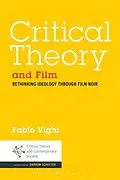Critical Theory and Film brings together critical theory and film to enhance the critical potential of both. The book focuses on the Frankfurt School, most notably the works of Adorno and Horkheimer, as well as associated thinkers. It seeks to demonstrate that cinema can help critical theory repoliticize culture and society and affirm the theoretical and political impact of cinematic knowledge. After discussing how the Frankfurt School saw cinema as an instrument of capitalism use to promote the cultural and political regimentation of the masses, Vighi then proceeds to demonstrate that critical theory can in fact suggest a different verdict on the progressive potential of cinema. Each chapter focuses on a key critical theory concept that is explained and redefined through film analysis to unravel the hidden presuppositions and most radical consequences of critical theory. A unique contribution to the literature, this volume in the Critical Theory and Contemporary Society series offer an innovative reading of film as a critical tool, drawing on the latest developments in Lacanian theory.
Autorentext
Fabio Vighi is Professor of Critical Theory and Italian at Cardiff University, UK. His previous titles include: Critical Theory and the Crisis of Contemporary Capitalism, co-authored with Heiko Feldner (Bloomsbury, 2015) and Between Urban Topographies and Political Spaces: Threshold Experiences (2014), co-edited with Alexis Nuselovici and Mauro Ponzi.
Klappentext
Critical Theory and Film brings together critical theory and film to enhance the critical potential of both.
The book focuses on the Frankfurt School, most notably the works of Adorno and Horkheimer, as well as associated thinkers.
It seeks to demonstrate that cinema can help critical theory repoliticize culture and society and affirm the theoretical and political impact of cinematic knowledge. After discussing how the Frankfurt School saw cinema as an instrument of capitalism use to promote the cultural and political regimentation of the masses, Vighi then proceeds to demonstrate that critical theory can in fact suggest a different verdict on the progressive potential of cinema.
Each chapter focuses on a key critical theory concept that is explained and redefined through film analysis to unravel the hidden presuppositions and most radical consequences of critical theory.
A unique contribution to the literature, this volume in the Critical Theory and Contemporary Society series offer an innovative reading of film as a critical tool, drawing on the latest developments in Lacanian theory.
Inhalt
Introduction
1. The Dialectic's Narrow Margin: Film Noir between Adorno and Hegel
Self-limitation in film noir
The noir panorama beyond spectatorship
Adorno goes to Hollywood
The negative and the whole
Ontology of self-deception in film noir
The Narrow Margin and double visions
A detour on ideology
2. On Critical Theory's Dialectical Dilemma
Horkheimer's method
The Kantian subtext
Hegel: contradiction (not) resolved
From mimesis to utopia
Critical Theory's fetishistic disavowal
3. A Configuration Pregnant with Tension: Fritz Lang for Critical Theory
Beyond the doubt of appearances
On polaroids and truth
Framing the subject
Sublimation in The Blue Gardenia
From paranoia to repetition
The gaze in the frame
The art of excremental painting
Coda: the enjoyment of film in theory
References
